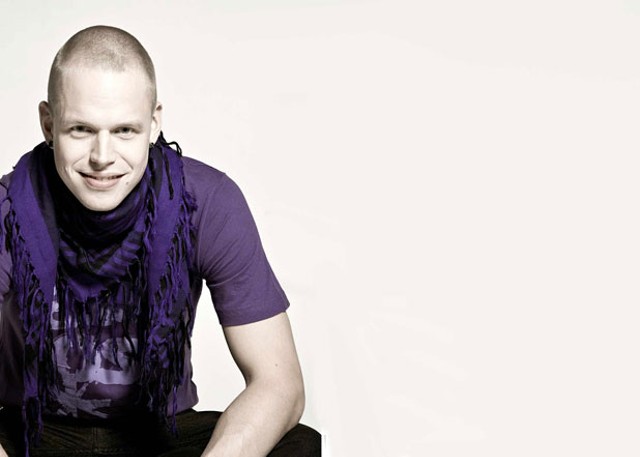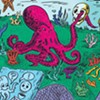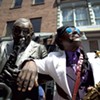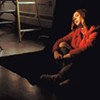Published April 11, 2012 at 5:30 a.m.
Finnish rapper Signmark considers himself to be part of a minority. In truth, he’s part of a couple minorities. For one, his native Finland is hardly known as a hip-hop hot spot, which makes him unique in Finnish music circles. He’s also deaf.
Signmark has embraced what many would see as a handicap. He views deafness as part of a “linguistic minority” and uses sign language to inspire societal change. With help from a hearing MC, who gives audible voice to Signmark’s musical ideas expressed through signed rhymes, the rapper has carved out an impressive career. He’s toured all over the globe and is signed to Warner Europe, making him the first deaf musician ever on a major label.
This Saturday, April 14, Signmark will perform at the Higher Ground Showcase Lounge, in celebration of Deaf History Month. In advance of that show, Seven Days caught up with the rapper by email. Because English is Signmark’s fifth language, portions of this interview have been edited or paraphrased.
SEVEN DAYS: When and how did you first experience hip-hop?
SIGNMARK: When I was a teenager, I translated many different songs to sign language, like Bon Jovi, Michael Jackson, AC/DC, NKOTB, etc. The first time I saw Coolio, Run DMC, the Fugees and MC Hammer, I started to read their lyrics and watch their music videos. They took my heart, and I started learning more about hip-hop (music, lyrics, art, clothes, etc.). I realized that I could make songs about equal rights, and that hip-hop would be a perfect channel for me to share my experience and life. So I started translating different hip-hop songs to sign language. Then I started writing my own songs.
SD: Is there much of a hip-hop scene in Finland?
The hip-hop scene in Finland is bigger than before. There are more hip-hop songs in radio and more hip-hop artists in festivals. Finnish people are really more interested in hip-hop music now than before, but still it’s not as big as rock, pop or heavy metal.
SD: What was the initial reception to you as an artist? Was there suspicion from other rappers, or more than there would normally be for a new rapper? Did you have to prove yourself?
It was 50/50, for both the hearing and deaf communities. In the hearing community, some people are so interested that sign language came to the music world. It’s a new, fresh and great experience. Some people still think that deaf is always deaf, and music is for ears. They forget eyes, sense of touch, etc. Also, for some hearing people this thing is too much for them: deaf guy, sign language, hip-hop.
Some deaf people are so happy to have a new role model. They can use my name to show their hearing friends and family that they can do anything. Others are excited to go to a nightclub and see an artist who is a deaf.
Some deaf people think that music is still just for hearing people. I think that it’s because of their experience: “You are deaf, you can’t play music!”
SD: You use a lot of very low frequencies in your beats and production. Is that because you can actually hear, or perhaps feel, notes and beats that low?
Yep, I have to feel all those beats on stage so I can count rhythms. All those kicks and vibrations are the most important things for me! I can’t live without it. I can hear some voices, but don’t know if it is a man or woman. Or is it piano or guitar? If someone screams my name I might hear it, but I don’t know where that voice came from.
SD: Do you write with a particular flow or rhythmic cadence in mind? If so, how does the MC know if he’s using the correct flow?
First, I write a story about the song. Then Brandon [the MC] writes lyrics about it, including flows. After that I make lyrics for sign language and “arrange” flows to sign language (not voice). So if someone doesn’t know sign language, they might miss my flow.
SD: When did you adopt the viewpoint that deafness isn’t a handicap but a linguistic minority?
When I studied at university. It was the first time I really asked, Who am I? What are my needs? What things could make me better? Also, I started comparing my deafness to other disabilities like blindness, people in wheelchairs, etc.
SD: Are there other genres of music you can experience in the way you experience hip-hop?
When you know what music feels like, you can do anything with it.
SD: If you weren’t a musician, what would you be doing?
Ice-hockey player. Go, Finland, go!
SD: What is the biggest misconception that hearing people have about the deaf?
That deaf people are disabled. I don’t feel that I’m disabled. I have my own interpreter, because hearing people don’t know sign language. But if we all knew sign language, I wouldn’t need one.
SD: Who are some artists you idolize?
I don’t have one artist whom I idolize. I like so many, because they are doing their own way. If I have to choose one right now, I’d say Eminem.
SD: What is the strangest, or perhaps funniest, thing that has happened to you on tour?
We had a live show in Ethiopia, far away from the city. When we got there with computers and electric things, we discovered there was no power in the building! Oh, well. It’s lucky we were in Africa, where there are a lot of drums.
Signmark plays the Higher Ground Showcase Lounge in South Burlington this Saturday, April 14, at 8 p.m. $15/20. AA.
More By This Author
Speaking of Music
-

Rain Curtails Historic 'Sound of Music' Concerts
Jun 22, 2024 -

Two Local Band Directors March in the Macy's Parade
Nov 22, 2023 -

Before a Burlington Show, the Wood Brothers Get Back to Basics
Oct 26, 2023 -

After a Half-Century of Leading Local Ensembles, Steven and Kathy Light Prepare a Musical Farewell
May 3, 2023 -

Double E 2023 Summer Concert Series Kicks Off With the Wailers
Mar 17, 2023 - More »
Comments
Comments are closed.
From 2014-2020, Seven Days allowed readers to comment on all stories posted on our website. While we've appreciated the suggestions and insights, right now Seven Days is prioritizing our core mission — producing high-quality, responsible local journalism — over moderating online debates between readers.
To criticize, correct or praise our reporting, please send us a letter to the editor or send us a tip. We’ll check it out and report the results.
Online comments may return when we have better tech tools for managing them. Thanks for reading.











































